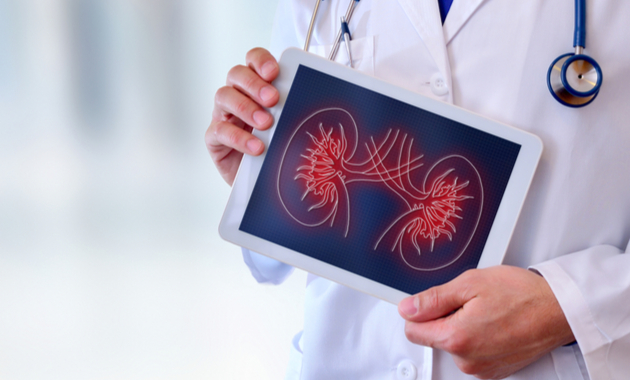
Diabetic kidney disease, also known as diabetic nephropathy, is one of the most common complications of diabetes. Diabetes and hypertension account for 40–60% cases of chronic kidney disease (CKD) in India[1]. If left untreated, chronic kidney disease can lead to kidney failure.
Dr. Bhupendra Gandhi, Senior Nephrologist, Amar Gandhi Foundation, Mumbai explains how excess glucose can affect the kidneys and tips to prevent CKD.
How does diabetes affect the kidneys?
If you are a long-standing diabetic or have uncontrolled diabetes, it can put you at risk of complications such as diabetic nephropathy.
Excess glucose can cause thickening of blood vessels in the kidneys. It also causes swelling of the filtration units (glomerulus) that affects the normal functioning of the kidneys.
Healthy kidneys do not allow excess proteins to pass through the filters. But when the filtration process is impacted, microalbumin, a type of protein, is excreted through urine. This gradually increases the pressure on the kidneys and in the long run leads to CKD and kidney failure.
You are at risk of diabetic nephropathy if you:
Consistently have a high blood glucose level.
Have high blood pressure.
Have a family history of kidney disease/hypertension.
Are obese.
Are a smoker.
Reduce your diabetes care expenses by upto 50%. Sign Up for 1mg Diabetes Care Plan.
Symptoms of diabetic nephropathy
Usually there are are no early warning signs of diabetic nephropathy. The symptoms appear only when the function of the kidneys starts to worsen, which is late in the course of the disease. In most CKD cases, around 70% of the kidney function is impaired when the symptoms start to appear.
Some of the common signs and symptoms of CKD are:
Swollen hands, feet, and face
Poor appetite
Nausea and weakness
Itching and dry skin
Sleep trouble
Muscle twitching
Drowsiness
Diagnosis of CKD
One of the best ways to detect diabetic kidney disease is to undergo a regular assessment of urine for microalbumin, a protein that is excreted in the urine due to defective kidney function. It acts as one of the first sign of kidney damage due to diabetes and can help to prevent the complications of diabetes.
So if you are diabetic or have been suffering from diabetes for more than two years, it is advised to undergo an annual urine test for microalbumin (protein) or as recommended by your doctor. It is also recommended even if you are taking medicines to control blood glucose levels or high blood pressure.
Book your Kidney test @1mg. Free sample pickup from the comfort of your home.
How to prevent diabetic nephropathy
Yes, diabetic kidney disease can be prevented if you keep your blood glucose levels under control with diet, medicine, and exercise. However, there are a few more things to keep in mind:
If you are above 40 years, it is advised to get your blood glucose, cholesterol and hypertension checked annually or as advised by your doctor.
If you are diagnosed with diabetes, ensure your HbA1c level is less than 7 (or less than 6.5 as advised by your diabetologist.)
If you are suffering from hypertension, your blood pressure should ideally not exceed 130/80 mm Hg.
If you have diabetes or hypertension or both, then get tested for urine microalbumin every year for early detection of kidney damage.
If you are diagnosed with kidney damage, ensure all the risk factors are under control and take medicines are advised by your doctor to improve kidney function.
If you are on medicines for kidney disease, make sure you control your diet by eating food which is low in proteins, fats, and salt.
**Consult India’s best doctors here**
Recommended Reads:
9 Signs That Suggest Your Kidneys Might Be In Trouble
9 Everyday Habits To Keep Your Kidneys Healthy
References:
1. Varma PP. Prevalence of chronic kidney disease in India – Where are we heading? Indian J Nephrol. 2015 May-Jun;25(3):133-5.